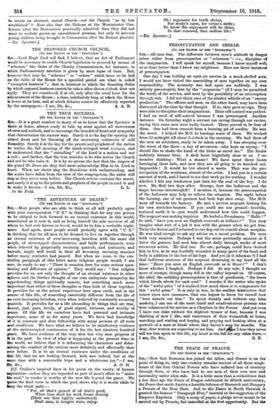PREOCCUPATION AND SHELLS.
[To THE EDITOR Or TEE " SPECTATOR."]
Snt,—All men fear. The difference between men's attitude in danger arises either from preoccupation or " soberness "—i.e., discipliner of the imagination. I will speak for myself, because I know myself welt; or at least better than I know my neighbour. Here are three instances of preoccupation.
One' day -I was holding an open-air service in a much-shelled area: I would not• have risked the assembling of men together on my own responsibility. The necessity- was laid upon me suddenly. I was entirely preoccupied, first by the -" exigencies" (if I may be permitted' the word) of the service, and next by the possibility of an interruption' through rain. I did not think once of the sinister whistle of an " enemy production." The officers and men, on the other hand, may have been distracted all the-time by that thought. If so, they gave no sign. They were able to discipline their imaginations. Their self-control was perfect. I had no need of self-control because I was preoccupied. Another instance. On Saturday night a servant ran raving thraugh our ravine, saying that some men were badly burned. There proved to be four of them. One had been rescued from a burning pit of cordite. He was the worst. I helped the M.O. to bandage some of them. We worked from 12 midnight till about 3 o'clock in the morning. We had three of the men on stretchers, ready to be taken away. I was stooping over the worst of the three—a boy of seventeen—who kept on saying " I should hie to shake the hand of the bloke as saved me." The Bache- suddenly became busy. A shell burst frightfully close to us. I re- member thinking : What a shame ! We have spent three hours bandaging these lads, and now they are all going to be knocked out. Impossible ! It would be too absurd a waste. That was the pre- occupation of the workman, almost of the artist. I had put in a certain amount of work, and I hated to see that work go for nothing. I wonder whether I felt any tenderness just then for the soul of the boy. I do now. He died two days • after. Strange, how the ludicrous and the tragic become intermingled? I mention it because the preoccupation of the ludicrous may help to relieve the situation. The night before the burning, one of our gunners had both legs shot away. The KO. went off towards the battery. He met' a section sergeant looking for his own stretcher-bearers. If you could see our groundhorrible, tortured earth it is—you would understand how this could happen. The sergeant was making inquiries. He hailed a Frenchman. " Hallo ! " he said, " have you seen an English camerade as is-blame 2" You may imagine what sort of a job it was with the gunner when we got him. Twice the doctor and I returned to our dug-out to consult about morphia. Ho was kind enough to ask my advice on a moral problem. We were both very anxious. Perhaps I was the more personally anxious as I. knew the gunner, had seen him almost daily through weeks of most strenuous action. He died too. No one, perhaps, could have desired him to live, as he was fearfully wounded in many parts of his head and body in addition to the loss of his legs. And yet (is it inhuman ?) I had that ludicrous pentence of the sergeant drumming in my head all the time : " Have you seen an English cameraele as is blame 1" I don't know whether I laughed. Perhaps 'I did. At any rate, I thought' no more of cramps, though many fell in the valley beyondqut Of course, the chief; the unfailing preoccupation is that of gentleness, " the hears which bleeds afresh for each soul." I wonder if the writer who spoke of the " awful price " of it realized how much there is to compensate for this " awful •price." It is only in war, in the sudden deatruction that comes upon men unawares, that one begins to know for oneself how " love casteth out fear." To speak frankly and without any false modesty, I am one of the most timid and unadventurous persons who ever vohmtoered for service as a Chaplain to the Forces.- And yet even I have run risks without the slightest tremor of fear, because I was thinking of men I like, and sometimes of their womenfolk at home, watching and waiting-and hoping, and praying and looking often at a portrait of a man in khaki whom they haven't see for months. The dear, dear women are expecting to see him. And gen I fear they never will see him again in this life, my heart is too full for any other fears--






























 Previous page
Previous page